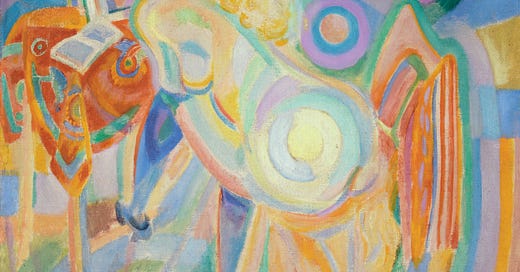The Radical Responsibility of the Reader
Writers sacrifice language. Readers bring it back to life.
I was a junior in college when the classroom—the fact of being sequestered in a plaster box under artificial lighting with others of an intellectual condition erroneously circumscribed by age—started to make sense. That’s a bit melodramatic, but metaphysically-speaking, it’s true. And it’s mostly a credit to the poet Maureen Seaton.
Maureen was teaching an intermediate poetry workshop in which we, her students, were expanding our range of formal approaches to the craft. In a previous section, taught by another wonderful poet, Mia Leonin, we had learned and practiced things more conventionally associated with poetic composition: repetition and inquiry, rhythm and ideation, and forms like the ode, sonnet, and pantoum. With Maureen, we inched closer to the root system and its dark surrounds: awareness and agency, those pillars at the threshold of manifestation.
For example, we practiced automatic writing, or stream-of-consciousness exercises. The latter term is so familiar as to seem almost cliche, but its affect is relentlessly idiosyncratic and bottomless. Essential questions are endemic to the process, which blurs (or reunites) mind and body: Where is the language coming from? How much control do I have? How much control do I want to have? How distinct are form and content, really? What separates a sound from a sign?
Am I dreaming? Will I ever wake up?
One of the things I remember Maureen saying in class was that if she wrote a poem in a workshop, she credited everyone present—with permission—with its composition. To be clear, this was not Maureen scattering her agency to the wind, absolving herself of responsibility for meaning in a grand gesture of projection. To the contrary, it was radically responsible, admitting of herself—especially as an author, with authority, having power—as being contingent on and inextricable from the presence and intelligence of others.
*
I have made a practice of seizing quiet moments at the bookshop to perform those bodily, equally procedural and instinctual tasks like shelving and tidying. And almost as a rule, the quiet moments in which such tasks begin quickly give way to something resembling frenzy.1 This is the nature of a community space, a public space; it is sonically dynamic, like a piece of music, and physically rhythmic, like a dance. Filled with our lives, the space lives, in turn.
The other day, I had a few more books to shelve, and the shop was newly astir. People were settled at tables and standing in line for coffee and noticing books, and I was threading my way through it all like a needle. Or so I thought.
Passing a table where two friends (of one another, and of mine) were sitting, I proffered crisp hellos while keeping my eye on a promising nook. I was building a nest for the remaining book-eggs in my mind when one of them said: “You seem like you’re in a hurry.” It was true—I was ‘moving with haste’—but something in me bristled at the observation.
There are many reasons to hurry, but one of the foremost, in western society, is to have miscalculated—which is to say misread—the passage of time. This, I felt in the moment, was not the case; rather, I was simply conformed to the the shape of time in the shop. I was not in a hurry, I was a manifold, a topology! How dare…
Justifications for seeming hurried flashed through my head like a branching thunderbolt, eviscerating my delicate nest. But why justify? It had been an observation, not an indictment, and there would be space and time enough later (here we are) to explore the energies. I mustered a laughing apology for being a brisk and bewildered bookseller; my friends sympathized with me. I went back to my shelving, and they went back to their laptops.
*
Radical responsibility proceeds from an understanding that environments are constituted by more than human persons,2 and that influence is not solely pronounced (discrete) but essentially present (connected). We act and are acted upon in mysterious ways, which is to say that mystery admits of our actions.
In a previous essay, I wrote about two people whose conversation upstairs at the shop turned spontaneously to their reading habits, and I made the rather obvious point that they probably started talking about books because they were surrounded by books. The thrust of this idea was not to draw a simple line between perception and conception—“you are what you eat”—but to suggest that when we become aware of the way in which our spaces and our minds are complicated,3 we have the opportunity to see ourselves far beyond the scope of self and preference. We have the opportunity to practice.
The radical responsibility of the reader is to affirm and ultimately celebrate their agency as practitioners of literature. Writers sacrifice and bury language; readers visit and bring it back to life.
Maureen Seaton passed away on August 26th, 2023, at the age of 75. Maureen was a jewel center of a person; a pioneering force in collaborative poetry; and a vast reservoir of encouragement for her students. Her books of poetry include Furious Cooking (1996), winner of both the Iowa Poetry Prize and a Lambda Literary Award; Venus Examines Her Breast (2004), winner of the Audre Lorde Award; and Sweet World (2019), winner of the Florida Book Award. Her memoir Sex Talks to Girls (2008; 2018) earned her a second Lambda Literary Award, and is a contemporary classic.
Did you know that a group of otters is called a ‘romp’? Time is a romp of otters. Take that, McTaggart.
Even built environments. Another possibility is that personhood exceeds the human, which David Mutschlecner considers beautifully in his “Person” sequence (see: Interim)
from Latin complicat- “folded together”




